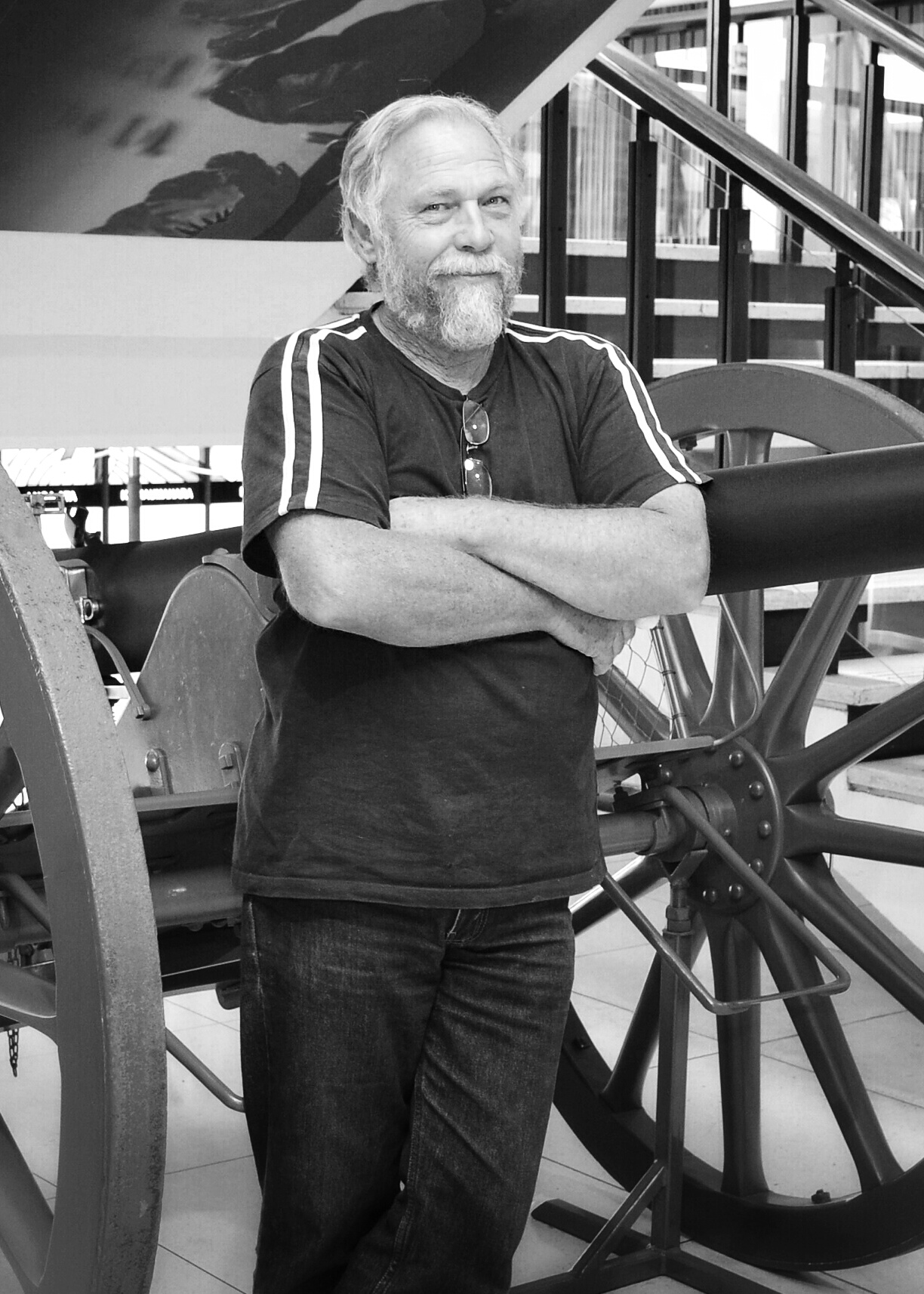
Geoff Lawson
Geoff Lawson was brought up by his father and grandfather and grew up to be independent at an early age. He didn’t like school and left at age fifteen to be an apprentice carpenter. An indentured tradesman at nineteen he soon met Wendy, and marriage, lovely daughters (and grandchildren too) soon followed. Even when he was young he was fascinated by the historical and spent many hours alone at the Museum.
His first foray into writing came when he was employed by the Whanganui Riverboat Trust to rebuild the Riverboat Building and the Waimarie, NZ’s last surviving paddle steamer. He collated a booklet outlying the restoration for the Trust and it is still in print. When his work for the Trust came to an end in the early 2000’s he became involved with the Whanganui Regional Museum for the restoration of the iconic Krupp Number Four, the first trophy artillery gun to be brought home by NZ troops. This was also to be a pamphlet, but after seven yrs. of restoration and research, it became a full length history book – ‘Our Gun. The incredible true story of Krupp Number Four and the Anglo Boer War’.
Next, came ‘Forgiven’, a novel based on knowledge of Victorian culture, the Anglo Boer War, and included a retake of some old family stories. Today, Geoffrey is retired, and is still married to Wendy (the good wife). He enjoys meeting his girls for coffee and the grandsons are doing well too. He has finished restoring his 125yr old wooden house and loves to potter with his 42yr old Toyota Cressida. He is also writing another book …
What authors did you dislike at first, but grew into?
Fiction writers Patricia Cornwell, Barry Maitland, Lynne Heitman, Dan Brown, et al.
Do you try more to be original, or to deliver to readers what they want?
Well, it is nice to be original, which is really the realm of fantasy, but if you are producing something for sale you have to provide something that the buyers would want. FORGIVEN has been written with careful attention to detail and really takes the reader on a voyage into the past. I think a lot of HF writers don’t actually know anything about the historical, and therefore write HF as a modern story with people in old fashioned clothes, and, presenting the past in this manner can lead to a lot of misconceptions. Since I am something of a historian I think HF can be exciting and interesting enough without modern fanfare and other such nonsense. Also, HF doesn’t need to mean ‘regency romance’ either. I think it all boils down to how you write it, and that is what makes it interesting…
How do you select the names of your characters?
I select names of characters randomly, whatever seems to fit in each case. I would never call a character Randy, or Storm, because no one in antiquity would be called something like that.
What was the first book that made you cry?
None, although one book really shocked me. Enemy at the Gate was so horrific that it took me almost a year before I could finish it. A history of the battle of Stalingrad, I think the thing that appalled me the most was that it was all true.
If you had to do something differently as a child or teenager to become a better writer as an adult, what would you do?
As a child I had no concept of writing, although I did read a large amount of adult books; histories and biographies mostly. I became a writer gradually, as I became interested in the things I was working on as an adult.
Have you Googled yourself? Did you find out anything interesting?
Googled myself? No, although I have found references to me in places I would not expect.
Are there any secrets in your books that only a few people will find? Can you tell us one? Or give us any hints?
There are no intentional secrets in Forgiven, although there is a lot of information about the old times that wouldn’t register with the majority of readers.
How did publishing your first book change your writing process?
What's the most difficult thing about writing characters of the opposite sex?
I don’t have any problems with writing about women. Since I was young I was fascinated by their logic and having a wife and two lovely daughters would have helped as well.
Do you read your book reviews? How do you deal with bad or good ones?
Disappointed sometimes. My first review on Goodreads was awful. Scathing, derogatory and harmful. It was a long time before anyone on Goodreads was game to read Forgiven. Amazon was different. I had 37 other reviews that totally disagreed with it, and made me feel a whole lot better. I think the reviewer was a young American woman who’s philosophy in life was ‘sex first and all else later’, which was the direct reverse of the Victorian model for a variety of reasons that someone like her would never comprehend. Never get involved with sites that ‘garrantee 50 reviews’ etc.. You’ll get burned if you do.
